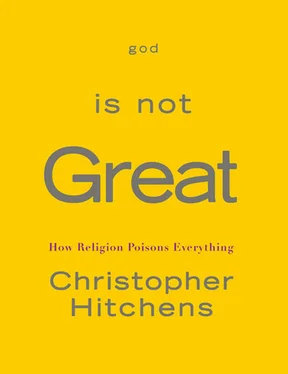I had been told in respectful and awed tones that “the Bhagwan’s body has some allergies,” and not long after my sojourn he fled the ashram and then apparently decided that he had no further use for his earthly frame. What happened to the Rolls-Royce collection I never found out, but his acolytes received some kind of message to reconvene in the small town of Antelope, Oregon, in the early months of 1983. And this they did, though now less committed to the pacific and laid-back style. The local inhabitants were disconcerted to find an armed compound being erected in their neighborhood, with unsmiling orange-garbed security forces. An attempt to create “space” for the new ashram was apparently made. In a bizarre episode, food-poisoning matter was found to have been spread over the produce in an Antelope supermarket. Eventually the commune broke up and dispersed amid serial recriminations, and I have occasionally run into empty-eyed refugees from the Bhagwan’s long and misleading tuition. (He himself has been reincarnated as “Osho,” in whose honor a glossy but stupid magazine was being produced until a few years ago. Possibly a remnant of his following still survives.) I would say that the people of Antelope, Oregon, missed being as famous as Jonestown by a fairly narrow margin.
El sueño de la razón produce monstruos . “The sleep of reason,” it has been well said, “brings forth monsters.” The immortal Francisco Goya gave us an etching with this title in his series Los Caprichos , where a man in defenseless slumber is hag-ridden by bats, owls, and other haunters of the darkness. But an extraordinary number of people appear to believe that the mind, and the reasoning faculty—the only thing that divides us from our animal relatives—is something to be distrusted and even, as far as possible, dulled. The search for nirvana, and the dissolution of the intellect, goes on. And whenever it is tried, it produces a Kool-Aid effect in the real world.
“MAKE ME ONE WITH EVERYTHING.” So goes the Buddhist’s humble request to the hot-dog vendor. But when the Buddhist hands over a twenty-dollar bill to the vendor, in return for his slathered bun, he waits a long time for his change. Finally asking for it, he is informed that “change comes only from within.” All such rhetoric is almost too easy to parody, as is that of missionary Christianity. In the old Anglican cathedral in Calcutta I once paid a visit to the statue of Bishop Reginald Heber, who filled the hymn books of the Church of England with verses like these:
What though the tropic breezes
Blow soft o’er Ceylon’s isle
Where every prospect pleases
And only man is vile
What though with loving kindness
The gifts of God are strown
The heathen in his blindness
Bows down to wood and stone.
It is partly in reaction to the condescension of old colonial boobies like this that many westerners have come to revere the apparently more seductive religions of the Orient. Indeed, Sri Lanka (the modern name for the lovely island of Ceylon) is a place of great charm. Its people are remarkable for their kindness and generosity: how dare Bishop Heber have depicted them as vile? However, Sri Lanka is a country now almost utterly ruined and disfigured by violence and repression, and the contending forces are mainly Buddhist and Hindu. The problem begins with the very name of the state: “Lanka” is the old Sinhalese-language name for the island, and the prefix “Sri” simply means “holy,” in the Buddhist sense of the word. This post-colonial renaming meant that the Tamils, who are chiefly Hindu, felt excluded at once. (They prefer to call their homeland “Eelam.”) It did not take long for this ethnic tribalism, reinforced by religion, to wreck the society.
Though I personally think that the Tamil population had a reasonable grievance against the central government, it is not possible to forgive their guerrilla leadership for pioneering, long before Hezbollah and al-Qaeda, the disgusting tactic of suicide murder. This barbarous technique, which was also used by them to assassinate an elected president of India, does not excuse the Buddhist-led pogroms against Tamils or the murder, by a Buddhist priest, of the first elected president of independent Sri Lanka.
Conceivably, some readers of these pages will be shocked to learn of the existence of Hindu and Buddhist murderers and sadists. Perhaps they dimly imagine that contemplative easterners, devoted to vegetarian diets and meditative routines, are immune to such temptations? It can even be argued that Buddhism is not, in our sense of the word, a “religion” at all. Nonetheless, the perfect one is alleged to have left one of his teeth behind in Sri Lanka, and I once attended a ceremony which involved a rare public showing by priests of this gold-encased object. Bishop Heber did not mention bone in his stupid hymn (though it would have made just as good a rhyme as “stone”), and perhaps this was because Christians have always foregathered to bow down to bones of supposed saints, and to keep them in grisly reliquaries in their churches and cathedrals. However that may be, at the tooth-propitiation I had no feeling at all of peace and inner bliss. To the contrary, I realized that if I was a Tamil I would have a very good chance of being dismembered.
The human species is an animal species without very much variation within it, and it is idle and futile to imagine that a voyage to Tibet, say, will discover an entirely different harmony with nature or eternity. The Dalai Lama, for example, is entirely and easily recognizable to a secularist. In exactly the same way as a medieval princeling, he makes the claim not just that Tibet should be independent of Chinese hegemony—a “perfectly good” demand, if I may render it into everyday English—but that he himself is a hereditary king appointed by heaven itself. How convenient! Dissenting sects within his faith are persecuted; his one-man rule in an Indian enclave is absolute; he makes absurd pronouncements about sex and diet and, when on his trips to Hollywood fund-raisers, anoints major donors like Steven Segal and Richard Gere as holy. (Indeed, even Mr. Gere was moved to whine a bit when Mr. Segal was invested as a tulku , or person of high enlightenment. It must be annoying to be outbid at such a spiritual auction.) I will admit that the current “Dalai” or supreme lama is a man of some charm and presence, as I will admit that the present queen of England is a person of more integrity than most of her predecessors, but this does not invalidate the critique of hereditary monarchy, and the first foreign visitors to Tibet were downright appalled at the feudal domination, and hideous punishments, that kept the population in permanent serfdom to a parasitic monastic elite.
How might one easily prove that “Eastern” faith was identical with the unverifiable assumptions of “Western” religion? Here is a decided statement by “Gudo,” a very celebrated Japanese Buddhist of the first part of the twentieth century:
As a propagator of Buddhism I teach that “all sentient beings have the Buddha nature” and that “within the Dharma there is equality with neither superior nor inferior.” Furthermore, I teach that “all sentient beings are my children.” Having taken these golden words as the basis of my faith, I discovered that they are in complete agreement with the principles of socialism. It was thus that I became a believer in socialism.
There you have it again: a baseless assumption that some undefined external “force” has a mind of its own, and the faint but menacing suggestion that anyone who disagrees is in some fashion opposed to the holy or paternal will. I excerpt this passage from Brian Victoria’s exemplary book Zen at War , which describes the way the majority of Japanese Buddhists decided that Gudo was right in general but wrong in particular. People were indeed to be considered children, as they are by all faiths, but it was actually fascism and not socialism that the Buddha and the dharma required of them.
Читать дальше












